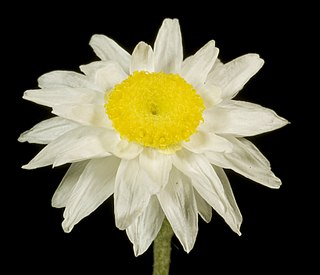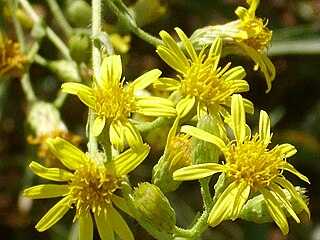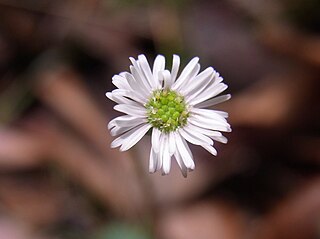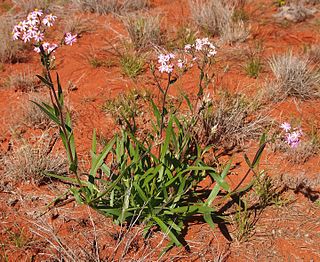
The Gnaphalieae are a tribe of flowering plants in the family Asteraceae. It is most closely related to the tribes Anthemideae, Astereae, and Calenduleae.
Wilhelm von Winthem (1799–1847) was a naturalist and entomologist from Hamburg, Germany, who was chiefly interested in Diptera and Hymenoptera. Well placed in a port city, von Winthem built a world collection.

Tetratheca is a genus of around 50 to 60 species of shrubs endemic to Australia. It is classified in the botanical family Elaeocarpaceae, now known to encompass the family Tremandraceae, which the genus originally belonged to. It occurs throughout extratropical Australia, and has been recorded in every mainland state except the Northern Territory.

Chrysocephalum, known by the common name everlastings for their long life as cut flowers, is a genus of flowering plants in the family Asteraceae. There are nine species, all of which were formerly classified under other genera.

Nidorella is a genus of African flowering plants in the tribe Astereae within the family Asteraceae, colloquially known as vleiweed.
Chthonocephalus is a genus of annual herbs in the family Asteraceae. The genus is endemic to Australia, with species occurring in all mainland states.

Hyalosperma is a genus of Australian flowering plants in the family Asteraceae.
Rulingia is a genus of flowering plants native to Australia and Madagascar. In 2011, all species were transferred to Commersonia with the exception of Rulingia cuneata, R. loxophylla, R. luteiflora and R. procumbens which have been transferred to the new genus Androcalva.

Inuleae is a tribe of flowering plants in the subfamily Asteroideae.

Lagenophora is a genus of flowering plants in the family Asteraceae. Species occur in South-east Asia, Australia, New Zealand, as well as Central and South America.

Nolletia is a genus of flowering plants in the tribe Astereae within the family Asteraceae. The genus was named in honour of Jean-Antoine Nollet, French clergyman and physicist.
Tuberostylis is a genus of Mesoamerican and South American plants in the tribe Eupatorieae within the family Asteraceae.
Adelostigma is a genus of flowering plants in the daisy family described as a genus in 1864. It is native to Africa.
Hypericophyllum is a genus of African flowering plants in the daisy family.

Schoenia is a genus of Australian plants in the tribe Gnaphalieae within the family Asteraceae.

Siloxerus is a genus of Australian plants in the tribe Gnaphalieae within the family Asteraceae.

Pogonolepis is a genus of Australian plants in the tribe Gnaphalieae within the family Asteraceae.

Chrysocephalum apiculatum, known by the common names common everlasting and yellow buttons, is a perennial herb native to southern Australia. It is a member of the Asteraceae, the daisy family. The name "everlasting" was inspired by its use as a long-lasting cut flower. It is increasing in popularity in Australia as a cottage garden plant, but is still not well known.

Joachim Steetz was a German botanist. His herbarium, comprising more than 5000 specimens from over 160 collectors and 30 countries was purchased in 1863 by Victorian Government Botanist Ferdinand von Mueller for the sum of 80 pounds. The collection is currently housed at the National Herbarium of Victoria. The herbarium was compiled by Steetz over more than thirty years and comprises 160 collectors from more than 30 countries, including type specimens from plant collectors of the time including:
Crystallopollen is a genus of flowering plants belonging to the family Asteraceae.











